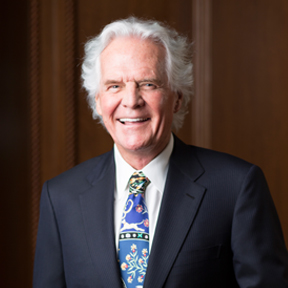
DR. BARNES REFLECTS ON THE PAST AND THE LESSONS HE LEARNED ALONG THE WAY.
As a young dentist, Dr. Dick Barnes ignored the conventional wisdom and envisioned a dental practice that gave patients care that they didn’t even know was possible. Instead of giving patients the drill-and-fill type of dentistry they were accustomed to, Dr. Barnes wanted something more for his patients. As a result, Dr. Barnes’s practice was a runaway success and eventually, he became known as a world-renowned leader in the dental industry. Today, Dr. Barnes’s vision extends beyond his practice. As an instructor, mentor, and the founder of Arrowhead Dental Laboratory and the Dr. Dick Barnes Group, he has taught thousands of dentists his vision of comprehensive dentistry.
When asked how he has been so successful, Dr. Barnes replied, “I honestly don’t know, because I didn’t do it; I mean, I didn’t aspire to it. It has just evolved in my life. The only thing I ever aspired to in my life—ever since I was twelve years old—was to be a dentist and then to be the best dentist I can. The rest of this all just kind of happened along the way.”
To celebrate the 40th anniversary of Arrowhead, Aesthetic Dentistry interviewed Dr. Barnes for a glimpse of his philosophy. Here’s what follows:
Humble Beginnings
Dr. Barnes was raised in the small, desert mining town of Taft, CA, located about 100 miles northeast of Los Angeles in the San Joaquin Valley. He was one of six children—he had three sisters and two brothers. His father, like most of the men in the town, worked in the oil fields. When Dr. Barnes was growing up, Taft was the nucleus of the oil industry in California. Oil was “black gold” in Taft and gave the town its lifeblood and sole industry.
Working in the oil fields didn’t require a formal education. Therefore, not many people in Taft received more than basic schooling. His parents only had an eighth-grade education; his sisters didn’t graduate from high school and his brothers barely did. “I never remember any books in our house, except for the textbooks that we brought home from school,” Dr. Barnes remembered. “However, my parents were very good people and hard workers. They taught us to be hard workers because of our circumstances.”
Since money was tight with eight mouths to feed, if any of the Barnes children wanted anything, they needed initiative to work for it. Because of that, from a very young age, Dr. Barnes had an entrepreneurial spirit and an inner determination that proved beneficial to him throughout his life. He said, “As a young boy, I remember selling newspapers. I’d buy them for three cents and then sell them for five cents. Then, I started my own shoeshine business. I knew that if I wanted to go to the movies for 25 cents, then I needed to sell some newspapers or shine some shoes.”
As a twelve-year-old B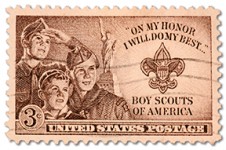 oy Scout, he found his future career path. “I really respected my Scoutmaster. He was a dynamic individual and a great mentor to me in the scouting program. He also appeared quite successful in his career as a dentist. I admired him and wanted to be like him. So I decided that I wanted to be a dentist just like him.”
oy Scout, he found his future career path. “I really respected my Scoutmaster. He was a dynamic individual and a great mentor to me in the scouting program. He also appeared quite successful in his career as a dentist. I admired him and wanted to be like him. So I decided that I wanted to be a dentist just like him.”
After high school graduation, Dr. Barnes became the first person in his family to attend a university. He did so, however, with some resistance from family members who were concerned about his future and career path. He recalled being home on break from college when his older brother, Roy (who was nineteen years old at the time), initiated a serious conversation.
“My brother was very practical. He worked in the oil fields and had a good job making, what he felt, was good money,” Dr. Barnes explained. “He sat me down and told me how foolish I was to become a dentist and go to the university. He had figured out how much money it would cost me to become a dentist and how much money I was losing by going to school instead of working in the oil fields.” Roy was certain that his younger brother was making a mistake.
However, Roy didn’t realize that his brother wasn’t looking at his career choice from the same perspective. Dr. Barnes remembers saying, “Roy, it has nothing to do with the money. I just want to be a dentist. I’m doing this because I really want to do it.”
The inner drive to become a dentist never left the young man. As he said, “The only thing I ever aspired to in my life was to become a dentist.”
A Drive for Excellence
Dr. Barnes lives by the philosophy that anything he does, he wants to do well. So not only did he want to become a dentist, he wanted to become the very best dentist he possibly could. In that way, he had an intense drive for excellence.
But excellence didn’t come easy. It took a lot of hard work. During dental school at Marquette University in Milwaukee, WI, he had to work extra hard to achieve success. He got married two weeks before starting dental school and during those four years, he and his wife had three children.
To put food on the table for his young family, Dr. Barnes (while enrolled in dental school full time), worked every odd job that he could find. In the evenings, he drove a mail truck for the post office and worked as a cashier at a paint store. He rose before sunrise to work an early morning shift at the local bakery—arriving at 3 a.m.—so he could squeeze in a few hours of work before his dental school classes. Even as a young husband and father, he was a dedicated and determined provider for his family.
Dr. Barnes made time to focus on his studies. And he didn’t just focus, he excelled. During dental school, he realized that one of his strengths was clinical work. He had all the qualities of a good dentist: skilled hands, sharp eyesight, and a keen perspective.
Just like a sculptor can envision a statue from of a chunk of clay, he could foresee the results of a dental procedure before he started working. “Even in dental school, I could perceive what the finished product should look like, which really helped me with my wax carving and other clinical work,” he explained.
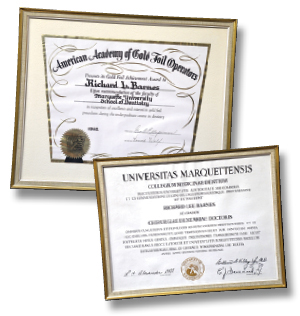 By his senior year, Dr. Barnes finished his clinical requirements, so his instructors allowed him to try some larger, more complex cases. He said, “I stumbled and bumbled, but those instructors were there to guide me along the way. I really wanted to know how to do complicated things and was happy for the opportunities.”
By his senior year, Dr. Barnes finished his clinical requirements, so his instructors allowed him to try some larger, more complex cases. He said, “I stumbled and bumbled, but those instructors were there to guide me along the way. I really wanted to know how to do complicated things and was happy for the opportunities.”
While in dental school in 1962, Dr. Barnes received the distinguished Gold Foil Achievement Award, as top clinician for outstanding gold foil work on two lower anterior incisors. His hard work and determination to be the best that he could started to pay off.
Early Years
After he finished dental school, Dr. Barnes started his own practice in Rialto, CA. Part of his career goal was finished: he was now a dentist. However, he knew that this was just the first step—the beginning. He still had a long way to go to reach the second part of his goal: to become the very best dentist he could be.
As Dr. Barnes explained, “Many dentists, even today, believe that once they finish dental school, that’s it, the learning stops. But education and learning is a lifetime process and we never give up on it. We’re learning new things all the time,” he stated. “I knew right out of dental school, that I really didn’t know that much about dentistry. I was struggling with crowns, struggling with how to make things right, so I really involved myself in continuing education from the very beginning.”
He took continuing education courses at the University of California at Los Angeles (UCLA) and became interested in the concept of comprehensive dentistry. At the time, it was assumed that everyone would eventually need dentures. But Dr. Barnes didn’t agree with this viewpoint. He thought it was important for people to do everything possible to keep their own teeth. “Philosophically, my job isn’t to go in there and pull teeth. My job as a dentist is to save teeth. I believed that from the very beginning of my practice,” he explained.
In the 1960s, few dentists were doing full arch prepping in one sitting. Dr. Barnes, though, didn’t see any reason why it couldn’t be done. Since there were no courses given on the topic, he taught himself. He said, “I thought it has to be easy enough if I do it step by step. I would start out by doing the maxillary upper right, get it temporized, and get a bite registration. Then, I would just pretend that I had another patient in the chair and prep the upper left side, make the temporary, and do the bite registration. Then, I would finish with the anterior. It was that simple. I just completed it step by step.”
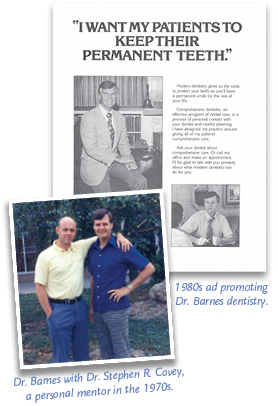 To get more experience, Dr. Barnes took on pro bono cases, where he would do an entire case free of charge for a person of limited income. He would even pay for the lab bill himself. “I considered my lab bill at that time to be my tuition in a full arch course,” he said. Doing free cases served a dual purpose. It helped patients get the quality care that they needed and their teeth restored. And it also helped him get experience so that he could improve at the type of dentistry he really wanted to do.
To get more experience, Dr. Barnes took on pro bono cases, where he would do an entire case free of charge for a person of limited income. He would even pay for the lab bill himself. “I considered my lab bill at that time to be my tuition in a full arch course,” he said. Doing free cases served a dual purpose. It helped patients get the quality care that they needed and their teeth restored. And it also helped him get experience so that he could improve at the type of dentistry he really wanted to do.
He also worked hard at developing his own assertiveness. From a very young age, Dr. Barnes recognized that he was an introvert by
nature. “I was always very shy in high school and always hoped the teachers would never call on me. I would turn beet red if they ever did call on me.” He admired people with a more assertive personality and wanted to improve that trait. So he studied and found ways to improve his confidence. He said, “I challenged myself by placing myself in situations where I was really uncomfortable. I sought out those situations because it was necessary for my growth.” Such efforts helped him throughout his career—particularly later, as a speaker and instructor of continuing educating classes for dentists from around the world.
A Career-Changing Conversation
In the 1960s, when Dr. Barnes was just starting out his dental practice, Dr. Lindsey Dewey Pankey, Sr. was one of the leaders in continuing education. Pankey’s practice was based in Florida and he taught dental seminars throughout the world. In 1969, The Pankey Institute was founded, based on his comprehensive, patient-centered dentistry methodology. Dr. Barnes never attended courses at the institute; however, he listened to Dr. Pankey at every available opportunity.
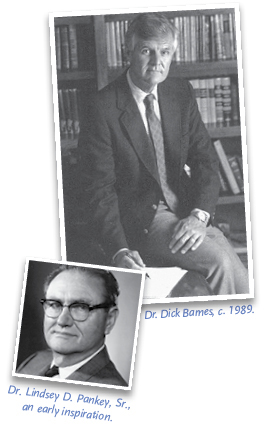 Once, Dr. Pankey spoke about his success with big, comprehensive cases for his wealthy patients. Dr. Barnes was very interested in the type of dentistry that Dr. Pankey described. However, the extensive nature of the procedures (and associated costs), made him feel uncertain about the feasibility of such procedures. He didn’t live and practice in a community that would support this type of advanced dentistry, or so he thought.
Once, Dr. Pankey spoke about his success with big, comprehensive cases for his wealthy patients. Dr. Barnes was very interested in the type of dentistry that Dr. Pankey described. However, the extensive nature of the procedures (and associated costs), made him feel uncertain about the feasibility of such procedures. He didn’t live and practice in a community that would support this type of advanced dentistry, or so he thought.
After the program ended, many people rushed up to talk with the famous Dr. Pankey. Dr. Barnes approached him and said, “Dr. Pankey, I can’t charge fees like that and do that kind of work in my community. My patients don’t have any money; they struggle from day to day.” Dr. Pankey looked at him and replied, “Then you have to get your patients to understand the value of the dentistry, because once they do, they’ll get the money.”
Patients understanding value. To Dr. Barnes, this was a revolutionary idea. Over the next few days, he thought about the concept frequently. And during that time, he asked himself, “What did Dr. Pankey mean by value?”
“I started searching and reading about the topic and realized that there was more to a successful dental practice than basic dentistry—whether the margins were right and what kind of cement you should use,” he explained. He learned that everything in life has value, if the benefits received outweigh the costs. “So, that’s where I started using the formula that I still teach today: Value = Benefits – Cost,” Dr. Barnes explained.
The key was helping his patients understand that quality comprehensive dentistry had value.
Providing the Best Dentistry to All Patients
Dr. Barnes knew that in order to become the best dentist he could be, he had to provide the best dentistry possible, to everyone. An individual’s net worth didn’t matter. Nor did it matter where they were from or what they did for a living. Everyone deserves the opportunity of the finest dentistry. As he said, “People are people, wherever they live. They deserve the opportunity to have the very best dentistry available.”
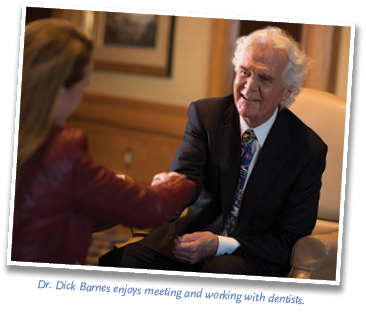 In his town at that time, he noticed that although many patients struggled financially, many of them also drove fancy pickup trucks. So nice trucks were obviously something that they valued and were willing to spend money on. People took out loans for trucks, so why wouldn’t they want to invest in their own dentistry? Dr. Barnes’s goal with his case presentations became clear. He wanted to help his patients realize the value that comprehensive dentistry could have for their lives and overall health and well being.
In his town at that time, he noticed that although many patients struggled financially, many of them also drove fancy pickup trucks. So nice trucks were obviously something that they valued and were willing to spend money on. People took out loans for trucks, so why wouldn’t they want to invest in their own dentistry? Dr. Barnes’s goal with his case presentations became clear. He wanted to help his patients realize the value that comprehensive dentistry could have for their lives and overall health and well being.
So he developed his skills in case presentation. To do so, he used some innate personality traits as an introvert. Instead of driving the conversation when he met with patients, Dr. Barnes listened to them. He said, “I wouldn’t write anything down. I would use my heart and my mind to really hear what they said. I would ask them what was really important in life. I would only ask a few questions and then let them do most of the talking. To me, meeting a new patient is still the most exciting thing in the world. Meeting new people and getting to know about them and how you can help them is really rewarding.”
His first attempts at presenting comprehensively to his patients weren’t 100 percent successful. However, the more he practiced, the more he improved. For the first several years of offering comprehensive treatment in his practice, he recorded his presentations and listened to them afterwards, so he could find ways to improve.
Dr. Barnes remembers a day, when a middle-aged man came into the office who needed about $5,000 worth of dentistry (at that time, a substantial amount of dentistry). When he presented the case, the man exploded. He shouted, “I would never spend that much money on my teeth!” Dr. Barnes remembers thinking that the obvious response would be to explain why the treatment costs so much. But instead, he leaned back in his chair and asked, “Why do you feel this way?” The man was somewhat surprised at the question but continued, “It’s because I got laid off from my job a month ago.” Dr. Barnes learned that the patient actually wanted the dentistry and saw the value—but it was a matter of not being able to pay for it at that time.
He responded, “So in other words, this is the type of dentistry that you’d like if you were employed?” The man responded affirmatively and plans were made. The man agreed to return once his employment situation was back on track. When the man left the office, he felt like Dr. Barnes was someone who was looking out for his best interests.
After analyzing all his presentations and the patients’ responses, Dr. Barnes discovered a pattern. After identifying the pattern, he developed methods for handling all of his patients’ concerns. The strategy of listening to the patients and then empathetically handling their responses, allowed him to develop a practice that was almost solely based on comprehensive care. Dr. Barnes’s practice flourished in a demographic area where most people might assume that people just “couldn’t afford” this type of treatment.
Opening the Lab
At the beginning of his career, Dr. Barnes said that starting a dental lab wasn’t on his radar. However, life has a way of evolving. Once he established a practice based on quality comprehensive care, his lab needs grew. Dr. Barnes’s monthly lab bill was large in the early 1970s (when a lab bill for a crown cost approximately $30).
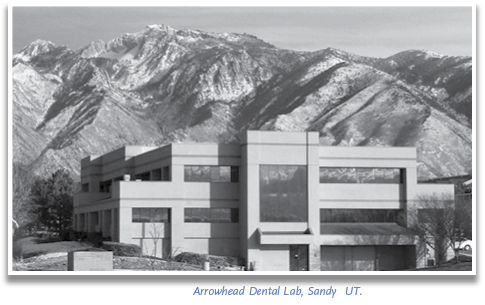 With a large volume of cases, he found it increasingly difficult to find labs that could provide the consistent results he needed for his full arch cases. So he remembers thinking, “I think I’ll start a lab.” And without any fanfare, that’s what he did.
With a large volume of cases, he found it increasingly difficult to find labs that could provide the consistent results he needed for his full arch cases. So he remembers thinking, “I think I’ll start a lab.” And without any fanfare, that’s what he did.
In 1975, Dr. Barnes found a good ceramist whom he trusted for quality work. He rented a room near his dental practice, where he could set up a desk, a furnace, and everything else the technician needed. And that was it. Arrowhead Dental Laboratory was born.
Over the years, Arrowhead has continued to grow and evolve. As Dr. Barnes’s case load became heavier, he started needing even more crowns. Then other dentists heard about the lab and asked if they could get their work done there, too. Eventually, the workload became too great for one ceramist, so Dr. Barnes hired more. Then they moved from a one-room shop to a larger facility to accommodate more workers.
Elaine, Dr. Barnes’s former wife, was the first president of Arrowhead and with her ingenuity, she helped grow the business. “She was a really balancing person, a good leader. She could work really well with people. She required a lot of the employees, but they loved her, as did I,” he explained. “In life, we need somebody like that to be our companion to help us through the challenging times and become successful.”
Today, Arrowhead is located in a world-class facility in Sandy, UT, with hundreds of employees. Dentists often ask Dr. Barnes, “How did you do this?” He always responds, “I didn’t do this, I was inspired somehow or another. I’m the leader, and I show direction. But I surround myself with good people who can get the job done and who have made Arrowhead the company that it is today. The people at Arrowhead are the people who make Arrowhead, not me.”
The Dr. Dick Barnes Group
Arrowhead’s success is largely because the company is more than just a dental laboratory. It’s a dental laboratory that is committed to mentorship and training, which it does through the Dr. Dick Barnes Group—the educational arm of Arrowhead. “My general nature is to help other people,” he explained. “That is the basic philosophy that we have at Arrowhead and the Dr. Dick Barnes Group—to help dentists become better dentists and be more productive. All dentists need the information we teach here. It just makes life easier and better for everyone. I don’t consider other dentists to be my competitors. I consider them to be my colleagues.”
Dr. Barnes always wanted to mentor and help his fellow dentists. Even in dental school, he helped classmates who needed assistance with clinical techniques. Then prior to starting the lab, Dr. Barnes worked as an instructor for dental students at the University of Southern California (USC). “One day, I received a phone call from USC. They asked me if I would teach one day a week. That was the last thing on my mind at that time! Yet when they made the offer, I thought it sounded interesting and I thought I could be of help, so I agreed.”
 At the same time, he began mentoring his fellow dentists who wanted to learn his techniques for case presentation and full arch reconstruction. “They wanted to come over and watch me do full arch cases,” he explained. At first, it worked out okay, but then it started to disrupt the workflow when too many people wanted to get the over-the-shoulder experience. He said, “At the time, I realized that I really did have something to say and maybe I should take it to a larger audience.” This led to speaking engagements at seminars all over the world. Dr. Barnes knew he couldn’t possibly teach all the seminars himself, so eventually he found like-minded dentists and other dental professionals to add to his team and he formed the Dr. Dick Barnes Group.
At the same time, he began mentoring his fellow dentists who wanted to learn his techniques for case presentation and full arch reconstruction. “They wanted to come over and watch me do full arch cases,” he explained. At first, it worked out okay, but then it started to disrupt the workflow when too many people wanted to get the over-the-shoulder experience. He said, “At the time, I realized that I really did have something to say and maybe I should take it to a larger audience.” This led to speaking engagements at seminars all over the world. Dr. Barnes knew he couldn’t possibly teach all the seminars himself, so eventually he found like-minded dentists and other dental professionals to add to his team and he formed the Dr. Dick Barnes Group.
Dr. Barnes’s philosophy of offering service extends beyond dentistry. During his busy early days of starting a dental practice, he was asked to serve on his town’s city council and help out as a police commissioner, which was a demanding, time-consuming responsibility. In addition, he also served in a leadership position with his local church. Once again, he didn’t agree to take on these responsibilities because he would amass great wealth, but because he hoped it might help others. The service opportunities in his community and church helped him have even greater compassion and empathy throughout his career.
Guiding Philosophy Brings Opportunities
Many people aspire to the success and opportunities that Dr. Barnes has enjoyed throughout his life. Yet Dr. Barnes never aspired to them; they resulted from a life in pursuit of excellence and service.
It wasn’t just good fortune or luck that provided Dr. Barnes with these opportunities and successes. They resulted from core values and philosophies that guided his life. Along the way, Dr. Barnes challenged himself beyond his comfort level and learned from the past—always with a standard of excellence in mind. He remarked, “Growing up in a humble family taught me that we have the responsibility to ourselves to become the very best we can, whatever that is. We should become the best dentist, the best leader, etc. If we accept a responsibility, then we need to do the very best we can at it.”
Dr. Barnes also had the foresight to envision a different way of practicing dentistry and the strength to follow his convictions. The combination of all these factors is truly the secret to his success. His life and career result from hard work, inner convictions, a vision for the future and helping others along the way. Forty years has gone by fast!

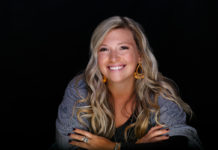








I was a patient of Dr. Dick Barnes in 1967 in Rialto, CA. I still have the first crown he put in my mouth! Recently I was at the U of U Dental School and one of the teaching Professors remarked about this original crown still being so viable and amazed it had lasted so long! At that time in 1967, I was 23 years old. Thanks Dick for a job very well done!